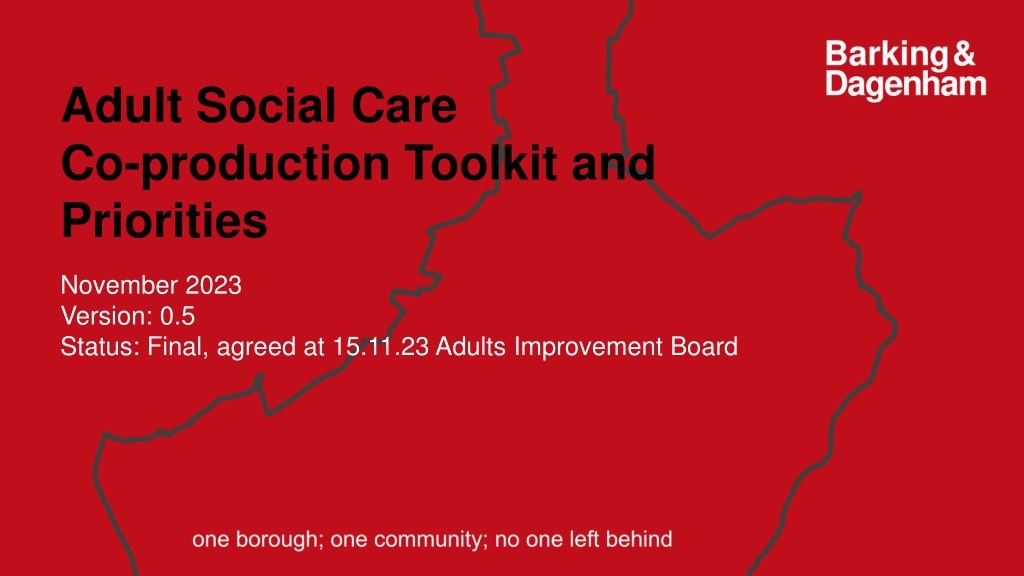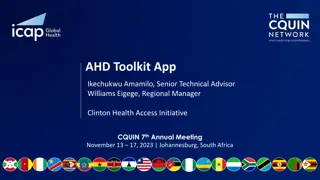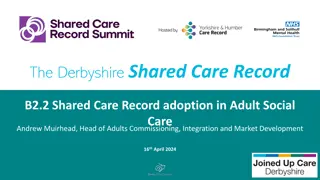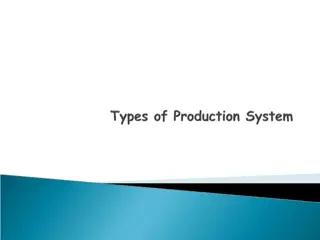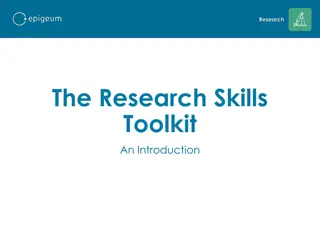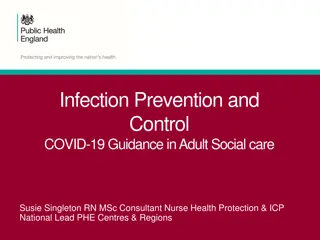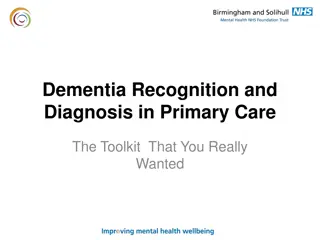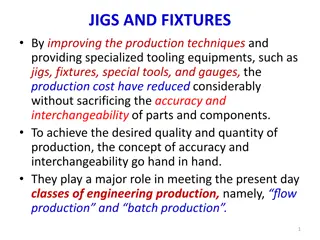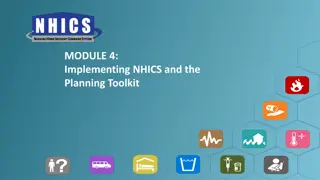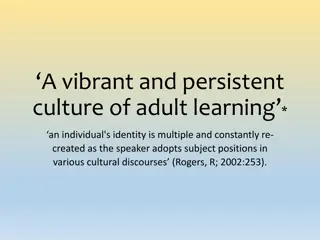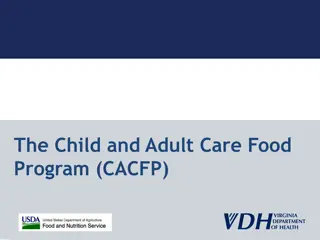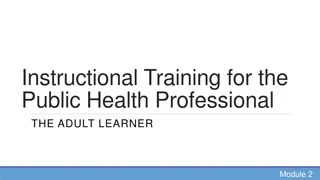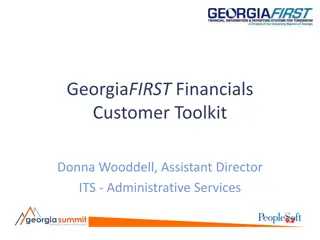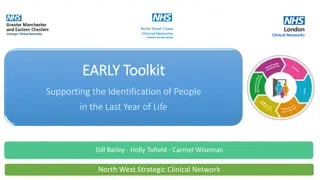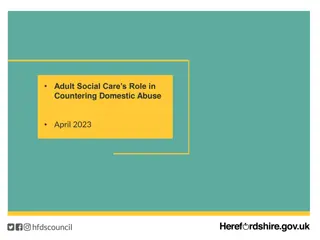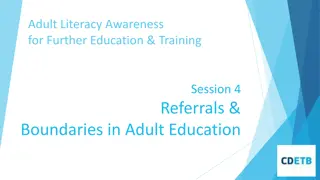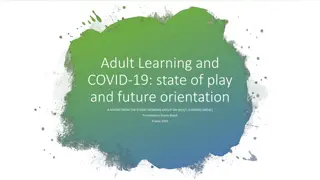Adult Social Care Co-Production Toolkit Overview
This toolkit emphasizes the importance of co-production in adult social care services, encouraging collaboration between service users and providers at all levels. It defines co-production, discusses its implementation in various aspects of care delivery, and outlines priorities for further development. The toolkit serves as a guide for staff to enhance co-production practices and improve service quality. Key elements include engagement activities, feedback from service users, and strategic priorities for the future.
Download Presentation

Please find below an Image/Link to download the presentation.
The content on the website is provided AS IS for your information and personal use only. It may not be sold, licensed, or shared on other websites without obtaining consent from the author.If you encounter any issues during the download, it is possible that the publisher has removed the file from their server.
You are allowed to download the files provided on this website for personal or commercial use, subject to the condition that they are used lawfully. All files are the property of their respective owners.
The content on the website is provided AS IS for your information and personal use only. It may not be sold, licensed, or shared on other websites without obtaining consent from the author.
E N D
Presentation Transcript
Adult Social Care Co-production Toolkit and Priorities November 2023 Version: 0.5 Status: Final, agreed at 15.11.23 Adults Improvement Board
1. Introduction Co-production is about an equal relationship between people who need adult social services and the people who work in adult social care, enabling people to work together in all aspects of care and support. Developing co-production across the local authority and partnership Co-production already happens across many areas of adult social care in Barking and Dagenham, but it is also something we need to strengthen and make a more consistent part of what we do. This co-production toolkit has been developed to be consistent with the approach to co-production across Barking and Dagenham. This Co-Production Toolkit has therefore been developed as a resource for staff to use in their work, to help strengthen co-production across adult social care. The toolkit provides brief guidance or points to consider in relation to: - A definition of what co-production is - Co-production in staff practice - Co-production in service design - Co-produced decision-making and service delivery - Co-produced staff recruitment and training - Co-produced evaluation and monitoring - Other forms of co-production - Working in inclusive and accessible ways - Rewards and recognition Our local health and care partnership are currently developed principles for co-production, including the principle no decisions about me, without me . This and other principles form the basis of the approach to co- production across adult social care. The toolkit then provides a summary of engagement and co-production activity, as of summer 2023, and a summary of feedback and insights from people with lived experience of care and support. The final slides sets out our priorities to develop co-production over the next 12 months. Everyone working in adult social care is encouraged to use the information and guidance in this toolkit to strengthen co-production, as part of our approach to continuously improving what we do.
2. Definitions We use the Think Local, Act Personal definition of co-production; using their ladder of participation that is set out below. Co- Coercion Educating Informing Consultation Engagement Co-design production This is the bottom rung of the ladder. People who use services attend an event about services as passive recipients. Their views are not considered important and are not taken into account. The people who use services are helped to understand the service design and delivery so that they gain relevant knowledge about it. at this stage. The people responsible for services inform people about the services and explain how they work. This may include telling people what decisions have been made and why. People who use services may be asked to fill in surveys or attend meetings; however this step may be considered tokenistic if they do not have the power to influence or affect change. Compared to the consultation step below, people who use services are given more opportunities to express their views & may be able to influence some decisions, but this depends on what the people responsible for services will allow. People who use services are involved in designing services, based on their experiences and ideas. They have genuine influence but have not been involved in seeing it through Co-production is an equal relationship between people who use services & the people responsible for services. They work together, from design to delivery, sharing strategic decision-making about policies as well as decisions about the best way to deliver services
3. Co-production in staff practice Aimed at: Practitioners working in adult social care. Points to consider: Practice standards - assessments The aim of co-production in staff practice is to complete assessments, support plans and reviews together, in equal partnership with the person who needs care and support and their friends and family. 2.2 I will work within the broader frameworks of strength-based practice; personalisation, self-determination, human rights and the social model of disability and help to identify the adults strengths and build a relationship with them to understand their story, by recording their wishes, feelings and views (including those that may lack mental capacity) as part of the assessment, when identifying their needs. This is based on the principle of doing with , not doing to ; recognising the person s expertise as someone with lived experience of care needs. Co-production is part of strengths-based practice. Assessment and support planning provide opportunities for practitioners and people with lived experience to work together co-productively to define goals and outcomes and to design the support needed to achieve these, focusing on what people can or could do, and what needs to be in place so they can use these assets to improve their outcomes and lives. More information on this is here. 2.3 I will seek to understand what wellbeing means for the person, so that I may know their values, their story, their strengths and talents and how they are currently being supported to live their life with regards to what outcomes they may desire and how they contribute to their community. Advocacy can support people who need support to express their needs and wishes. The Practice Standards related to co-production and staff practice are opposite, providing guidance on what is expected.
4. Co-production and service design Aimed at: Commissioners and staff working on strategy, policy and projects. 4.1 Service specifications points to consider: The aim here is to co-design care and support services are articulate this in the specification. A useful first step is to review and use existing feedback from people with lived experience. Then work with people who currently use services - e.g., via focus groups or interviews - to see what is working well and should be maintained, what could improve, and what would best fit future needs and wishes. Agree key elements of the service specification. Case study - co-produced Carer Charter The 2022-25 Carer Charter Action Plan is our commitment and plan to continue to identify and support carers, co-produced with carers through joint working with carer forum members, surveys and online feedback. The Carer Charter is made up of a set of I statements, describing the outcomes that support to carers is aimed at achieving. These statements were co-produced with carers and form the basis of the carer action plan. 4.2 Tendering panels The aim is to involve people who use services in tendering panels, to decide together who should provide services. There are different formats this can take e.g., separate panels, joining panels, setting questions. Think through the support people may need to get involved including via pre-meets etc. 4.3 Strategy The aim is to co-design a future ambition and strategic plan on a topic related to social care. A useful first step is to review and use existing feedback from people with lived experience. Then gather ongoing insights from people impacted by the strategy e.g., carry out outreach or form a reference group, to agree a particular future ambition, priorities, outcomes and actions. This should start before any formal consultation starts. 4.4 Policy The aim is to agree together a policy approach to a particular issue, e.g., complaints or charging A useful first step is to review and use existing feedback from people with lived experience Then speak to people impacted by the policy, e.g., via focus groups and agree an approach on areas where discretion can be applied. This should start before any formal consultation starts.
5. Co-produced decision-making and service delivery Aimed at: Managers, commissioners and staff supporting Boards 5.1 Representation on Boards The aim here is to make decisions together in key governance meetings with people with lived experience. A useful first step is to think through how the person/people will be identified or recruited, what support might be needed and how it will be provided, payment, whether attendees are acting as representatives and how the meetings might change to be more inclusive. A number of different formats are possible depending on needs and wishes of attendees. Case study - Working with a volunteer to gather feedback from people A volunteer based in the commissioning service makes regular spot check phone calls to people getting homecare or a direct payments to check on their experience and get feedback. Around 10 people are phoned each week by the volunteer. Findings are followed-up and used by the commissioning team. 5.2 Working with volunteers The aim is to work with volunteers with experience of social care on specific pieces of work together. A useful first step is to think through recruitment, support and any expenses. Doing this links with broader aims to support those most likely to experience employment barriers to get work experience (e.g., adults with a learning disability) 5.3 Working with people who need care and support Working with people to deliver services can be done in different ways, including commissioning the voluntary and community sector to work with people (e.g., on a specific topic) or by commissioning things like peer support groups in mental health or substance misuse. This is likely to require resources, support and payment; and timescales, outputs and outcomes will need to be thought through. 5.4 Employment The aim is to employ people with lived experience of care within the sector. A useful first step might be to meet with postholders or services who support adults with support needs into employment. Think through the role, accessible recruitment, flexible working arrangements and support. Doing this links with broader aims to support adults with a learning disability, mental health issue and carers into employment.
6. Co-produced staff recruitment and training Aimed at: All managers 6.1 Staff JD s and interview questions The aim here is to co-design recruitment processes to reflect the views of people who need support. This could include agreeing what staff qualities should be in the Person Specification, and/or agreeing one or all interview questions with people who need support. A useful first step is to review and use existing feedback from people with lived experience. Work with people who currently use services - e.g., via focus groups or interviews - to agree on the Person Specification and/or interview questions. Case study - Involvement in staff interview panels In one organisation, a programme was put in place to interview staff with people with lived experience. HR provided half-day recruitment and selection training to people with lived experience of mental health issues and social care. People interested in being part of an interview panel at the end of training were contacted every time an interview was planned. One trained person was included in an interview panel, agreeing interview questions and scoring candidate answers. Feedback from those who participated was that the experience increased their confidence and gave useful insights on job recruitment processes. 6.2 Staff interview panels The aim here is to make a joint decision on shortlisted candidates at interview. This could be through people setting questions, having a separate panel, or joining a staff interview panel. A useful first step is to think through how to identify/recruit people interested in getting involved, checking conflicts of interest, training, pre-meets, support and payment. Liaise with HR on this. 6.3 Designing staff or partner training The aim here is to co-design staff or partner training so that it reflects the needs and wishes of people with lived experience e.g.; recent training on identifying hidden carers. A useful first step is to review and use existing feedback from people with lived experience. Work with people who have experience of the training topic - e.g., via focus groups or interviews - on what the training should include. 6.4 Delivering staff or partner training The aim here is to work with people with lived experience to deliver training to staff or partners. This could be done by working with a provider organisation, or directly with people. The format could be people telling their stories (e.g.; via a short film) as part of training, or leading whole virtual or in-person training sessions. A useful first step is to think through support, resources, logistics, support and payment.
7. Co-produced evaluation and monitoring Aimed at: Commissioners, managers of in-house services 7.1 Mystery shopping The aim here is to gather insights with people with lived experience on the quality of adult social care via mystery shopping. This could include mystery shopping phone calls or observation visits at places that provide information and advice. A useful first step is to think through training requirements, support, payment, information governance considerations. The services being mystery shopped will also need to be engaged with this work. Case study In one local authority area, commissioners worked with people who used mental health services to train people to be quality assessors . Quality assessors then carried out site visits to check services with a commissioner, using a framework to judge how well providers were operating. 7.2 Enter-and-view visits Healthwatch have a legal power to visit health and care services and see them in action. In adult social care, this includes care homes, day centres and supported housing. Healthwatch put together a picture of what people think of the care they are receiving and write a report as a result. A report with findings is provided to the service and commissioner. A similar model could be replicated elsewhere in social care. Case study - Healthwatch Barking and Dagenham Enter and View visit Healthwatch Enter-and-View visits include those to care homes carried out in 2019. Reports with findings are available to view here. 7.3 Monitoring information The aim here is to monitor the quality of care or any specific issues together with people with lived experience and agree any improvement actions. This could be by regularly reviewing monitoring data or visiting and checking services. A useful first step is to think through the accessibility of the monitoring information and how and when it will be discussed and presented. Monitoring information on adult social care could be done by setting up new group of people with lived experience, or regular attendance at an existing meeting or Board.
8. Other forms of co-production 8.1 Co-producing information This involves working with people with lived experience to co-produce information and advice related to social care. This could include the design, layout and text online, in leaflets or in multi-media. Care Act statutory guidance mentions the importance of co-producing information and advice. 8.2 Participatory budgeting This is where people are involved in deciding how public money is spent. This is sometimes done at a small scale (e.g., a devolved budget held by a group of people with lived experience) or a large scale (e.g.; making decisions about broader budget issues such as priorities and savings). Click here for more information and case studies on participatory budgeting. 8.3 Participatory research This is where subjects of research become involved as partners in it. This could therefore include people with experience of social care carrying out research with other people who use services. 8.4 User-led organisations These are organisations that are run by, and for, people who need care and support. Organisations often arose from the disability rights movement and mental health user/survivor activism. Click here for more information on user-led organisations. Click here for more information and case studies on Citizens assemblies. 8.5 Citizens assembly These are representative groups of local residents to learn about, deliberate and make recommendations on a particular issue or set of issues.
9. Working in inclusive and accessible ways Working in inclusive and accessible ways is essential to ensuring co-production is successful. The Social Care Institute for Excellence highlight four principles that are critical in relation to putting this into place. These are: Equality, diversity, accessibility and reciprocity (or getting something back for putting something in) and are explained more below. EQUALITY Everyone has assets DIVERSITY Being as inclusive as possible ACCESSIBILITY Everyone has the same opportunity to take part fully, in the way that suits them best. This means considering: Communication needs. Accessible venues (see guidance) & medium. Meeting out-of-pocket expenses. Support to get meaningfully involved. RECIPROCITY Getting something back for putting something in. This means: Work in equal partnership. Avoid tokenism. Be clear together on what can and cannot be influenced. This means: Hearing a wider range of views Understanding who is impacted by a service or decision. Considering outreach vs. in-reach. Considering work carried out by the council vs. an independent group. This means: Acting on insights. Telling people what has happened as a result of their insights. Considering rewards (see next slide). Consider wider benefits (e.g., employment skills)
10. Rewards and recognition guidance Rewards and recognition for co-production is about recognising the contribution people have made to improving adult social care, though giving up their time and energy to co-produce support. It can include payment or vouchers for some activities, but also non-financial rewards. 6) Consider the time commitment and contribution that people make, including any preparation time. For example, someone taking part in an interview panel might spend several hours preparing for and helping interview shortlisted candidates. Someone taking part in a focus group might have committed two or three hours. 7) If considering using cash or vouchers as reward, consider using London Living Wage as a guide to the value. For example, if someone attends a 2-hour focus group, a 25 voucher could be provided. 8) Be aware of the potential impact that rewards can have on people s benefits. Cash or voucher rewards might impact on people s benefits, and people should be advised of this. 9) Be clear on roles and responsibilities. This includes the responsibilities of the local authority to ensure out- of-pocket expenses are met and agreed rewards issued, and the responsibilities of the individual including their responsibilities to declare rewards if in receipt of benefits. 10)Having a clear audit trail. This includes keeping receipts for out-of-pocket expenses and getting signatures to confirm receipt of any vouchers or cash. You may want to draw up an agreement to cover both this and expected roles and responsibilities, depending on the activity and time commitment. Examples of rewards and recognition Thank-you letters. Lunch provided at a meeting. A trip or event. Personal development opportunities (e.g., training). Vouchers. Cash. There is currently no single, agreed approach to rewards, recognition and co-production; and it is important to note that there is no agreed policy on this issue. When deciding an approach to your co-production activity, please consider the following as guidance: 1) No-one should incur out-of-pocket expenses. This may mean having cash ready to reimburse the cost of someone s bus or tube travel to get to a meeting or agreeing another method. 2) It is recommended that any significant out-of-pocket expenses e.g., the cost of replacement care so a carer can attend a meeting be agreed in advance. 3) The contribution people have made should be recognised and rewarded, but the form this can take can vary depending on the activity and preferences. Some reward examples are listed opposite. 4) It is suggested that forms of engagement and consultation (e.g., people filling in a paper survey or online questionnaire) not be rewarded. 5) Consider people s personal preferences on rewards. For example, some people do not want vouchers or cash and see their role as purely voluntary, whereas others do.
11. Rewards and recognition case studies Case study 1 A task-and-finish group Case study 2 Co-production launch event Case study 3 Staff recruitment Case study 4 Partnership Board A task-and-finish group is set up to look at and agree on the ways in which financial assessment and charging processes in adult social care can change. People with lived experience of care and support and staff are members of the group. Each meeting last for 1.5 hours, and papers are sent out in advance. People with lived experience have all out-of-pocket expenses to attend the meeting met. People with lived experience are given a 25 voucher per meeting, to recognise their contribution and the time commitment involved. Each voucher is signed-for, and receipts evidencing out-of-pocket expenses are saved. An event is organised to launch some co-production activity. It is held in a large, easily accessible location and is advertised to everyone with experience of social care. People do not have to RSVP but are advised to let us know if they have any out-of- pocket expenses (e.g., travel costs) needed to attend the event. To progress co-production in staff recruitment, a half-day of recruitment and selection training is provided to any person with lived experience interested in this. Out-of-pocket expenses are met, and refreshments are provided at the training. A person who has then completed the training agrees to be part of an interview panel for a social worker role. The reading time before the interview and interview themselves take 4 hours. The person is given a 50 voucher, to recognise their contribution and the time commitment involved. Each voucher is signed-for, and receipts evidencing out-of-pocket expenses are saved The Learning Disability Partnership Board works with adults with a learning disability to set up a regular group for people with lived experience to meet and inform the work of the partnership board. Group members decide they would like their contribution to be recognised and rewarded through a trip organised each autumn, open to everyone who has been to and contributed to at least one meeting. The event includes lunch, to recognise the contribution and time given by attendees. Out-of- pocket expenses are met and receipts are saved.
12. Where to go for more help and resources Help and resources within Barking and Dagenham Help and resources outside Barking and Dagenham Within the council, the Participation and Engagement team can provide support and advice related to co-production, including intranet pages with guidance, information and tools to effectively plan and deliver good engagement. Click here for more details. The team support a network of Engagement Champions who are often a good resource for advice and support on planning co-production or sharing insights. Outside the council, the following organisations and sites have a good resources on co-production: Social Care Institute for Excellence guidance and resources Think Local, Act Personal guidance and resources Local Government Association guidance and case studies Association of Directors of Social Services (ADASS) resources: South East ADASS guide to co-production in adult social care (Feb 2023) West Midlands ADASS what does good look like in co-production? (2022-23) Involve resources on co-production NHS England guidance on co-production Staff within adult social care will also have useful advice and insights to draw on. This includes our Information and Engagement Lead Jolene Davis and staff who have carried out recent co-production work or contributed to this toolkit.
Appendix I: Activity in LBBD adult social care, as of August 2023 Co- Coercion Educating Informing Consultation Engagement Co-design production Charging leaflet Carer Charter & Action Plan Using insights from ASC Surveys Design of extra-care supporting housing Charging policy Hospital discharge leaflet/s Experience of hospital discharge (Red X) Website information for residents New leaflets planning on SG & assessments Experience of care technology Direct payment forms and information Design of DP Support Service Improving comms (B&D, tbc) Hospital discharge & loneliness (Care City) Insights on quality of care - phone-calls = Current or planned activity Design of new homecare service = Regular or ongoing activity Insights on inequality in ASC (Healthwatch) = Recent activity Raising awareness of self- neglect & SG (B&D, tbc)
Appendix II: Summary of how we work with people who use adult social care and carers, as of August 2023 Insights via surveys & questionnaires Annual service user survey Bi-annual carer survey Aids & adaptation feedback questionnaire Phone calls surveys to homecare & DP users Regular feedback from care technology users Online consultation and engagement Including: Charging policy consultation Working with groups of people who use care & carers Forward Together Carer Forums Focus groups Speaking to people in services (e.g. ECSH) Working through the CVS Including: Healthwatch B&D Collective Care Provider Voice Red Cross Involvement in decision-making forums Including: Tender panels
Appendix III: Summary of insights from people with lived experience of support, as of August 2023 This report summarises feedback and insights between summer 2021 and summer 2023 from people who use care and support and carers. awareness-raising setting out what safeguarding is and what to do if concerned. Satisfaction levels with care and support in LBBD are high. People value staff who care, listen and understand. People have said social care helps them in a number of ways: The biggest impacts are on quality of life and feeling safe. There is a smaller impact on social contact and how people spend their time. It should be noted that much of this feedback and insights have been acted on. For example, as a result of the interviews with people being discharged from hospital, new information has been produced and is given to people at the point of discharge and new information aimed at carers has been developed. People who get homecare and direct payments have suggested that the timeliness of care visits and being told about changes to visits is an issue sometimes, but feedback on this and their experience of care in other areas is overwhelmingly positive. These insights have informed our 2023 Adult Social Care Improvement Plan, which sets out the actions we will take to improve adult social care over the next 3-5 years. The need for clear, accurate and easy to understand information and advice has been highlighted as an area to improve by people who need support and carers. Communication between staff and residents has also been highlighted as an area to improve in relation to knowing where to get support, getting hold of people on the phone, reviews taking place over the phone, hospital discharge, direct payments, charging and telling people the outcome of safeguarding concerns or enquiries. It would be useful to carry out more prevention and community
Appendix IV: Co-production priorities Co-production priorities Four key priority areas were agreed at November 2023 Adults Improvement Board to be progressed in relation to co-production over the next 6-12 months. These are: 1. Co-production in staff recruitment, focusing on adults with a learning disability and the disability service. 2. Developing co-production in service specifications and tendering panels for all commissioned/re- commissioned services. 3. Support the Safeguarding Adults Board to deliver its strategic plan objective: Hear the experiences of people with lived experience and use the feedback to develop the work of the SAB and its priorities . 4. Continued co-design and co-production with carers, to deliver the Carer Charter and Action Plan. A Co-production Plan A more comprehensive Co-Production Plan will be developed in 2024-25. This will be co-produced with people who need care and support.
